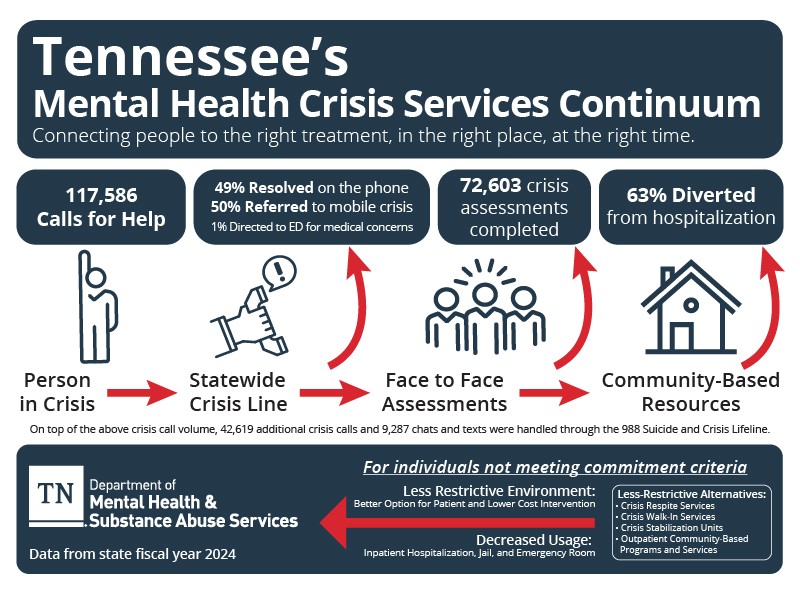Crisis Services & Suicide Prevention
📲 Need help now? Call or Text 988 and press 0 to talk to a trained counselor. You can also chat with 988lifeline.org.
You can get help any time, day or night.
Who We Are
Tennessee has many crisis services resources including 24/7/365 statewide mobile crisis for both adults and children and youth. Tennessee is also home to several Crisis Stabilization Units (CSU) and Walk-In Centers for both adults and children and youth. In addition, the rollout of the national 988 Suicide & Crisis Lifeline has further expanded access, offering Tennesseans a simple, three digit number to connect with local mental health support anytime.
If you need help now, please call or text 988 and press 0 to talk to someone who can help or start a chat with 988lifeline.org. People who work on 988 are based locally in Tennessee and are connected to community-based resources that can help. Help is available anytime.
Want to learn how Tennessee's crisis services continuum works together to get people the help they need? Watch the video below to learn more.
Available Services
- Mobile Crisis Services
- Walk-In Centers
- Crisis Stabilization Units (CSUs)
- Crisis Respite
- Suicide Prevention Initiatives
- 988 Services
Services are designed to support individuals of all ages, in every part of Tennessee.
How to Access Help
If you or someone you know is struggling:
📲 Call or Text 988 and press 0 for free, confidential help from trained crisis professionals.
📍 Find Local Crisis Services
🚑 Mobile Crisis Response
Available in all 95 counties to meet you where you are.
🏢 WIC/CSUs
Walk-in services available
Learn more about the continuum of crisis services available in Tennessee by clicking this link.
Reducing Hospitalizations, Improving Outcomes
One of the primary goals for Tennessee's crisis services continuum is ensuring connection to care at the right place, at the right time, in the right setting. The goal of this is to connect an individual with the clinically-appropriate level of care for the symptoms they are experiencing while avoiding unnecessary inpatient hospital stays. Successful diversion to less restrictive methods of providing treatment reduce the impact to the consumer and their family while reducing the impact on more expensive, publicly funded resources. Our experience in Tennessee shows a successful diversion rate of for about 2 in 3 patients who come in contact with the crisis services continuum. Read more about how this works in our onepager at this link or click the image at right.
Explore Further
Ready to learn more about Tennessee's crisis services continuum? Use the links below to get more information.

